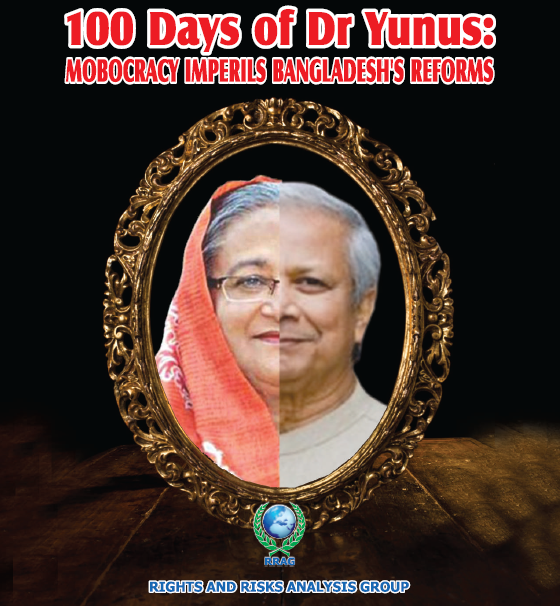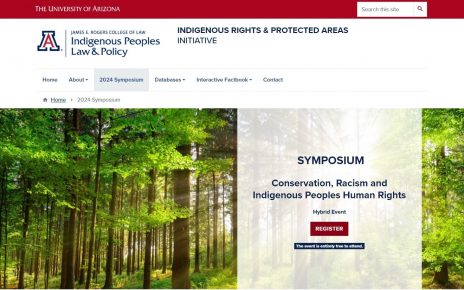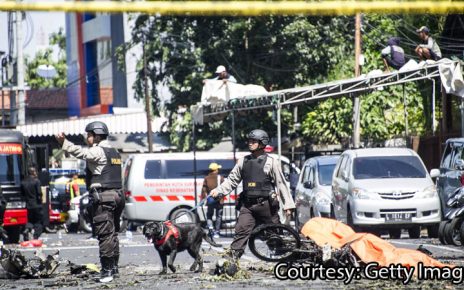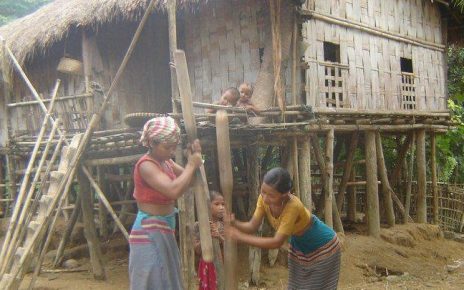It took a ‘textbook example of ethnic cleansing’ of the Rohingyas in Myanmar for many in the world to wake up to Noble Laureate Daw Aung San Suu Kyi. Another Noble Laureate Dr Mohammed Yunus, Chief Advisor of the Interim Government of Bangladesh, who took oath on 8 August 2024, continues to enjoy largesse notwithstanding replicating every act of deposed Prime Minister Sheikh Hasina through the mob rule i.e. whims and fancies of the Anti-Discrimination Student Movement leaders and increased violations of the rights of the indigenous peoples and religious minorities. The indemnity issued by the Bangladesh Government which barred the law enforcement personnel from arresting or filing cases against anyone involved in the July-August uprising in which at least 44 policemen were killed remains unprecedented and is an act not done by Sheikh Hasina!
The full report, 100 Days of Dr Yunus: Mobocracy Imperils Bangladesh’s Reforms, can be accessed here
Gross human rights violations committed during the first 100 days of Dr Yunus with impunity as summarized below expose little or no improvement of human rights situation in Bangladesh:
- Criminal cases against at least 2,72,316 persons, mainly political opponents, in 1,598 cases from August to October 2024;
- Targeting of about 354 journalists including acts of violence against at least 74 journalists, criminal cases against at least 113 journalists and cancellation of press accreditation of at least 167 journalists;
- Establishment of compliant judiciary by removing five Supreme Court judges including the Supreme Court Chief Justice and 12 High Court judges because of the protests of the Anti-Discrimination Student Movement;
- Dissolving the NHRC by forcing all the members to resign on 7 November because of the critical monthly report in October which were contrary to the Interim Government’s claims on law and order situation;
- Use of the discredited International War Crimes Tribunal against political opponents in more than 80 complaints of crimes against humanity and genocide filed as of 4 November 2024;
- Increased attacks on indigenous peoples in the Chittagong Hill Tracts (CHTs) from 19 September to 1 October 2024 in which at least four indigenous persons were killed, 75 indigenous hill people were seriously injured and at least 142 houses, shops and other business establishments, properties, Buddhist temples were looted, destroyed or set ablaze on which the report of the government’s Inquiry Commission has not been made public as yet;
- Complete “NO” to the implementation of the CHTs Peace Accord by Dr Mohammed Yunus;
- Over 2,000 cases of alleged attacks on the religious minorities dismissed by Dr Yunus without any investigation that the Hindu minorities faced attacks because “there is no clear distinction between Awami League supporters and Hindus”;
- Effective ban on the freedom of association and peaceful assembly by the indigenous peoples and the religious minorities as shown from the systematic attacks upon indigenous peoples from 19 September to 1 October in the Chittagong Hill Tracts following the “March For Identity” organized by “Sanghat O Boishamyo Birodhi Pahari Chhatra Andolan” (Anti Conflict & Discrimination Tribal Students Movement) at Khagrachari on 18 September 2024, and registration of a case naming 582 people, mainly Hindus as accused after acts of violence upon the Hindus on 5 November in the Hazari Gali area Chittagong;
- Continuous use of the draconian Cyber Security Act with 11 cases having been filed with no signs for repeal of the Act;
- Indemnity issued by the Bangladesh Home Ministry barring the law enforcement personnel from arresting or filing cases against anyone involved in the July-August uprising15 in which at least 44 policemen were killed; and
- Attempt to establish ‘Awami League Free Bangladesh’ by banning its students wing, Chhatra League, as a terrorist organization, excluding the Awami League led 14-party alliance from any discussion on the proposed reforms and thereby seeking the Awami League ban from participation in the elections.
Dr Yunus is still not being questioned despite these gross human rights violations, indeed repeating everything that was wrong with Hasina’s tenure: political intolerance and exclusion, silencing press freedom, making judiciary compliant, dissolving the NHRC, using the International War Crimes Tribunal, the Cyber Security Act and sedition against political opponents etc. In fact, under Dr Yunus there have been more attacks on indigenous peoples and the religious minorities. What is more worrying is the mob-rule: Dr Yunus’s Interim Government using the students to justify all the illegal and unconstitutional acts including to remain in power as long as he wishes.
As late as 14 November, Dr Yunus reiterated that elections will be held only after reforms. These reforms can take months or years, and he can remain in power even though these reforms can be effectively rejected by the next elected government.
And none can question these proposed reform measures or delay in holding elections because of the fear of the mob. Even the main political party, Bangladesh National Party, has been hesitant to be not seen as against the students. The Jamaat-e-Islami has become the key support system for Dr Yunus’s government. By banning the Chhatra League, the student’s wing of the Awami League, as a terrorist organization and burning down the headquarters of the Jatiya Party, an ally of the Awami League, on the night of 31 October with impunity, the Interim Government appears to have chosen the path of no return.
Dr Yunus appears to have squandered the opportunity for establishing genuine democracy in Bangladesh through national reconciliation. If the international community continues to support so-called reforms for the sake of support without taking into account the basic fact that wide ranging reforms being undertaken need not be acceptable to the next elected government, Bangladesh is bound to fail.
Therefore, the recommendations of the UN High Commissioner for Human Rights to allow his office to be established in Bangladesh to support the “transition process” including by “offering advice on legal, institutional, economic and social reforms, transitional justice, reconciliation, and healing” remain critical.
It is abundantly clear that on the issue of addressing human rights violations during the first 100 days, the UN High Commissioner for Human Rights Mr Volker Turk and the Office of the UN High Commissioner for Human Rights appeared to have been more assertive and upfront than many international NGOs monitoring the situation in Bangladesh. This does not bode well for Bangladesh.



